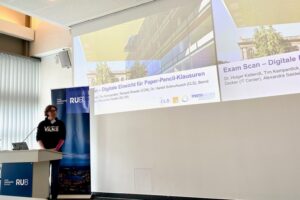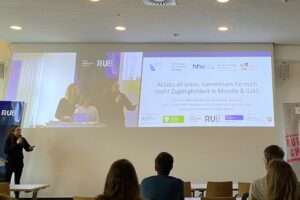
Source: Own illustration
Harald Schnurbusch at the presentation “Exam Scan – Digital insight for paper-pencil exams”
After the Moodle university meeting at the University of Leipzig in March, the competence centers ILIAS.nrw and Moodle.NRW jointly invited to a community meeting at the Ruhr University Bochum (RUB) on April 10. The meeting was aimed at all those involved in the use and development of the Moodle or ILIAS learning platforms at their university or other educational institutions. Colleagues from the “Service & Communication” department also accepted the invitation and are happy to report on the gathering here.
In addition to the opportunity to exchange ideas with other participants in personal discussions, a total of 16 sessions were held on various topics relating to the platforms and the design of digital teaching. RWTH Aachen University was also involved with a presentation. As in Leipzig, Harald Schnurbusch from the Center for Teaching and Learning Services (CLS) presented the Moodle plugin Exam Scan developed at RWTH.
Accessibility in Moodle

Source: Own illustration
Presentation “Access all areas: Working together for even more accessibility in Moodle & ILIAS”
In the first session, Katharina Gleser from the University of Wuppertal presented how teachers can check their learning room content for accessibility. If, for example, images are added to a text page, a description of the image, a so-called alternative text, must also be provided. Alternative texts are read aloud by screen readers. This means that no important information is lost for blind and visually impaired people. However, this is not the case if the box next to “Image for decoration only” is checked. There is still room for improvement when adding images, as images that are inserted into the Moodle learning space via drag-and-drop, for example, are automatically classified as decoration.
If the “Link” activity is used, the question mark symbol indicates that the link text should be meaningful. However, the activity does not warn you when saving if the “Name” field only contains something like “Link”. There is still room for improvement here too.
Moodle can therefore still be developed further in terms of alternative texts and meaningful descriptions.
Accessibility can be checked via the text editor, but as with the activities mentioned above, the accessibility checker also has some catching up to do. In the session, the Atto editor was chosen as an example. The checker did not find all errors there.
It is currently not possible to report identified barriers from within Moodle. However, there are plans to incorporate such a reporting function in the Moodle Boost Union theme.
eLearning Support
The subtitle of the session by Guntram Fink and Saraa Feiter from the Niederrhein University of Applied Sciences on the topic of eLearning support was “Exchange on the interaction between central and decentralized institutions/stakeholders”. This topic was particularly exciting for the colleagues from the Service & Communication department, as the department serves as the first point of contact for most inquiries from RWTHmoodle users as 1st-level support. As a result, regular exchanges take place with the internal specialist departments for development and operations as well as colleagues from the Center for Teaching and Learning Services. This session showed that regular exchanges with all those involved are part of everyday life.
The use of ticket systems is also very widespread. The advantage of such systems is that customer inquiries are processed in a traceable manner and are not dependent on individuals. This means that absences by individual agents, for example due to vacation or illness, do not stop requests from being processed. A ticket system is also used at the IT Center. All inquiries sent to the IT-ServiceDesk are received there. For example, inquiries about RWTHmoodle are processed via the ticket system. Depending on the request, these are forwarded to the relevant specialist departments. Didactic support is provided by the Center for Teaching and Learning Services in the form of advice and training.
To round off the day, there was a get-together where participants were able to discuss the presentations or try out one or two of the topics discussed live. All in all, it was a successful meeting. We are already looking forward to seeing what the next community meeting has in store.
If you have any questions or suggestions about RWTHmoodle, please contact the IT-ServiceDesk. The Center for Teaching and Learning Services also offers training courses for teaching staff.
Responsible for the content of this article is Verena Grouls.




